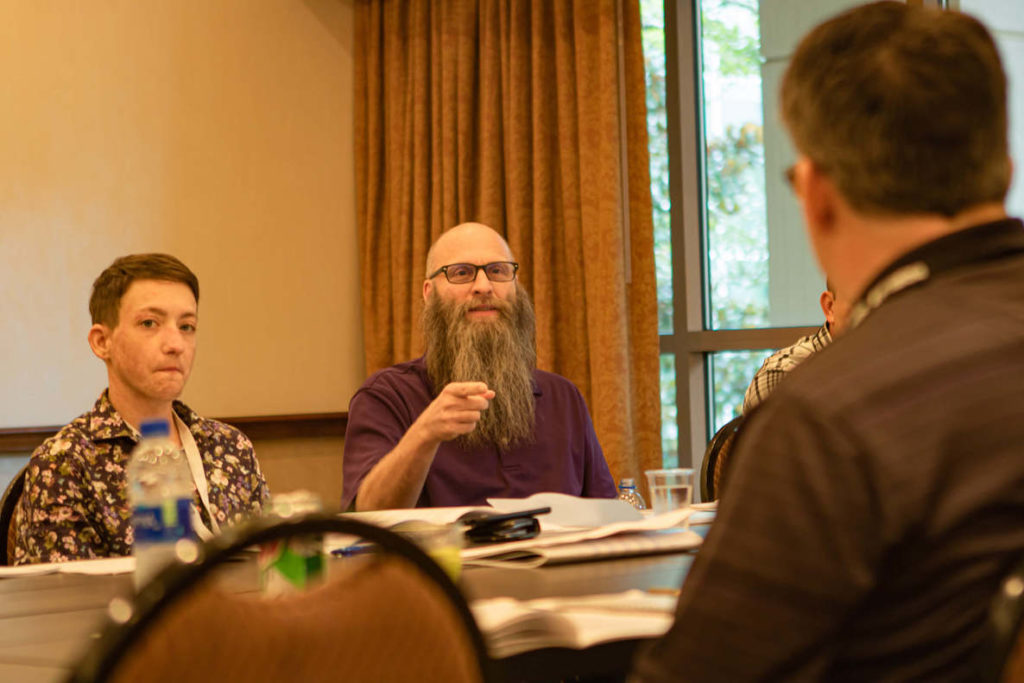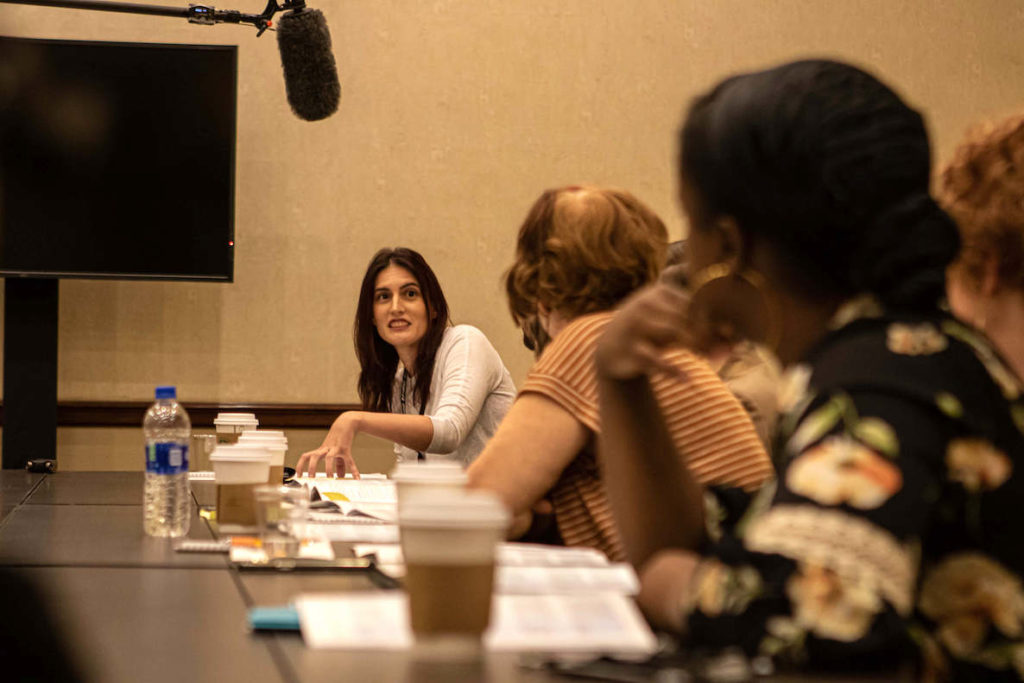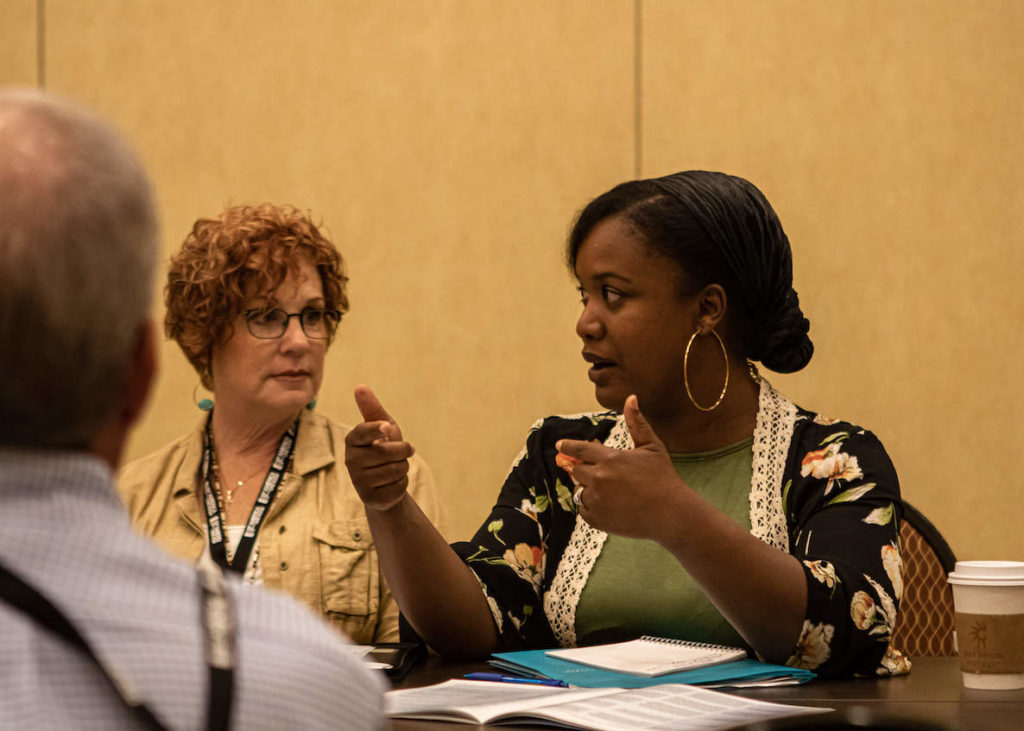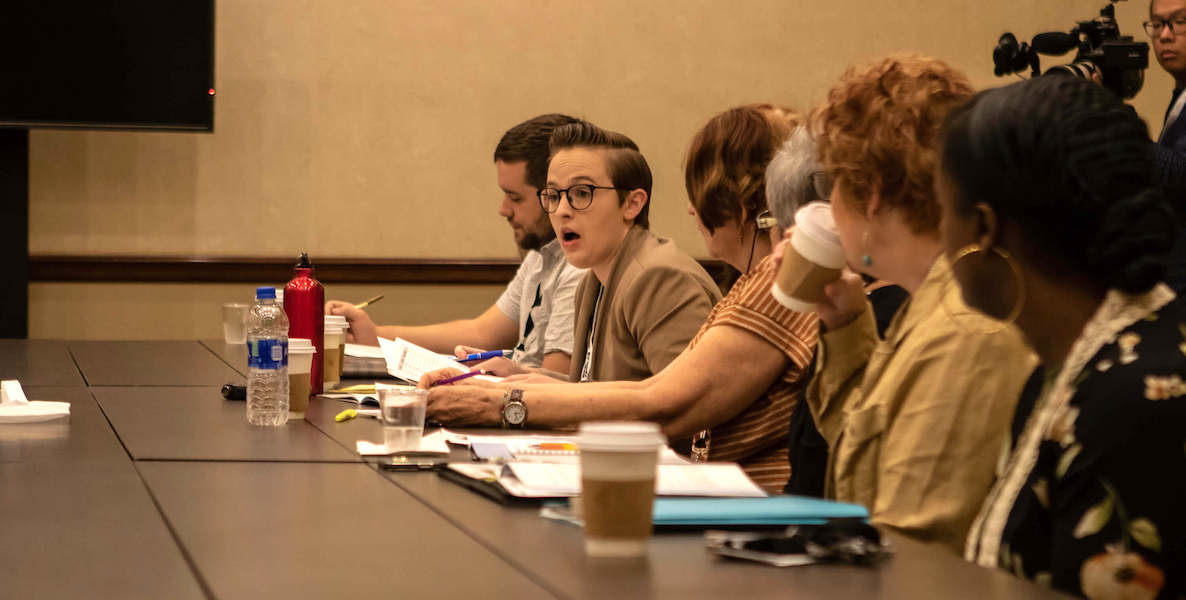to this story in CitizenCastListen
With good reason.
Now, if that bonehead neighbor was part of a decision-making body composed of a statistically representative sample of the entire country, and was provided with bias training and objective, 360-degree expert testimony on the topics at hand, maybe you’d calm down…but still be skeptical.
How could you possibly rely on Average Joes to make decisions that policy wonks have spent their entire lives studying and practicing? How can you expect humans, who seem to cling so willfully to their beliefs and tend to seek only information that validates them, to make reasonable, fair decisions in the best interests of everyone?
Well, a growing body of research says it’s not only possible, but desirable.
Citizens’ Assemblies are opening and changing minds

One leader in the chorus calling for this approach to democratic decision-making, commonly called deliberative decision-making, is Brett Hennig, head of the U.K.-based Sortition Foundation.
Help steal the ideaDo Something
“To date, ‘representative’ has meant that you elect your representative, and in theory they’re responsive to the needs of their constituents. But there are lots of problems with elections and reasons why an electorate assembly actually wouldn’t be responsive to the constituents and would be swayed by vested interests, which we’re all very well aware,” Hennig told me one morning in March via Zoom, while social distancing with his four kids in Budapest.
“People realized that they can come together, they can meet in some way to pursue policy that could work for themselves and probably for the rest of the country, and so they didn’t feel as polarized and divided as much as conventional polling and media coverage would suggest,” Siu says.
He recognizes the knee-jerk rejection many people feel when they first hear about the idea.
“The fact that it’s random is what most people cling to. But in fact it’s actually the fact that it’s random that means you break the link with vested interests,” he says. Most people, he adds, can be critical-minded; you can actually “skill up” the members of these Citizens’ Assemblies to be critical thinkers.
“If you choose people that aren’t the usual suspects, who aren’t typically politically engaged, what we find is that people are aware of their own lack of information and take their role very seriously,” Hennig says. “They’re really willing and open to change their minds and change their opinions.”
Citizens’ Assemblies are working in other countries

Research out of Stanford University’s Center for Deliberative Democracy (CDD) confirms Hennig’s insight.
Alice Siu, PhD, is the associate director of CDD, and was on the team that led the America In One Room project in September 2019, a gathering of 500-plus statistically representative voters from all around the U.S. who met in Dallas to address topics including immigration, healthcare, foreign policy, environment, and the economy.
Among the most fascinating takeaways from the widely heralded event was the fact that there were significant opinion changes before and after deliberation.
“People realized that they can come together, they can meet in some way to pursue policy that could work for themselves and probably for the rest of the country, and so they didn’t feel as polarized and divided as much as conventional polling and media coverage would suggest,” Siu says.
Citizens’ Assemblies are currently in place around the world. The most well-known example is in Ireland, where the Citizens’ Assembly is credited with overthrowing the ban on abortion.
There are lots of problems with elections and reasons why an electorate assembly actually wouldn’t be responsive to the constituents and would be swayed by vested interests.
“There was a political hot potato: What to do with the constitutional ban on abortion? No politician was willing to step forward. There was the Catholic church on the one side, and civil society on the other,” Hennig explains.
So they brought this representative group of people together to come up with a proposal. And that completely opened up the political space to act. “The politicians were able to step into that space and say I am going to implement what these informed people said.”
Brett Hennig’s captivating TedxTalkWatch
The topics that are best-suited to Citizens’ Assemblies, Hennig points out, are ones where there’s a series of options and it’s not clear which is best—each has its pros and cons.
In terms of coronavirus, for example, Hennig said back in March that it would’ve been interesting for a Citizens’ Assembly to address the question of whether shutting down is acceptable, given the safety risks, or unacceptable, given the impact on the economy.
“These sorts of trade-offs would be perfectly suited to a Citizens’ Assembly event, and you’d want to have experts talking about the health issues, and economists talking about the financial issues. l could see it being really useful in situations where the way forward comes with pros and cons, and it’s essentially a moral question about what is the best way forward.”
Getting Citizen Assemblies to work in Philadelphia

Both Hennig and Siu acknowledge that for Citizens’ Assemblies to work, a few pieces must be put into place. For one, the selection process must be statistically rigorous, to guarantee the most representative sample. For another, there must be funding, particularly to cover the costs associated with childcare and eldercare that could otherwise eliminate entire swaths of a population.
For America In One Room, for example, participants were given the option of payment for childcare, or covering the cost of their child or partner to travel with them; everyone was given an honorarium for their participation; and accommodations were made for those with disabilities and different needs. In today’s era of Zoom and limited travel, many of these costs would be eliminated.
And, Hennig says, you need political buy-in. “Without political buy-in, it’s just a talking shop,” he says. “You have to try to convince the politicians that this is a great idea to try. And one of the best ways is to go to them and say What is a problem that you wish you could solve but you can’t, because of a political deadlock or too many vested interests pulling in every different direction?”
“Without political buy-in, it’s just a talking shop,” Hennig says. “You have to try to convince the politicians that this is a great idea to try.”
Every politician, he wages, has one issue that they really wish they could solve, but are blocked from doing so. Citizens’ Assemblies open up the political space to act by bringing a legitimate group of people together in an informed environment to come up with a concrete proposal.
Right now, the folks who are most inclined to attend City Council or local government meetings are not representative—they’re already highly motivated.
Findings from America in One RoomDelve Deeper
Inspiring tomorrow’s leaders
Jack Santucci, assistant teaching professor in the Politics Department at Drexel, points to the fact that in the U.S., Citizens’ Assembly-ish logic is starting to make inroads in local politics in areas like participatory budgeting, as seen in Boston.
He could see Citizens’ Assemblies being useful on issues like electoral reform. “Different groups of people have issues with the way that elections are done in Philadelphia. And it’s not clear to me that those groups agree on what the remedies would be, or even what the diagnoses of the problems are. But there’s a demand for ‘solutions’ to things like setting the order of names on the ballot, or the way that the at-large seats are elected, which is about 70 years old now. Do we want some other way of dealing with that or not?”
“It’s really our responsibility to show the next generation what it actually means to have a society that can get along,” says Siu.
Santucci points to Citizens’ Assemblies as a way to make progress where common models of reform—politicians doing nothing, versus deep-pocketed donors swooping in to rally for referenda—stall.
It’s the approach that was used in Ancient Greece. It’s an approach that will work for your neighbor. And it’s an approach that Siu would especially like today’s youth to recognize.
“I recently spoke with an undergrad who told me that the only view they have of politics from their formative years, which is the last four to six years, is of division and extremity,” Siu says. “It’s really sad to hear somebody who’s so young be so skeptical about politics. It’s so important that we offer a glimmer of hope for those that are in high school right now, and let them know that politics goes beyond people bickering. There were times that people were able to sit and talk and have a conversation with each other. And it’s really our responsibility to show the next generation what it actually means to have a society that can get along.”
All photos courtesy Helena


